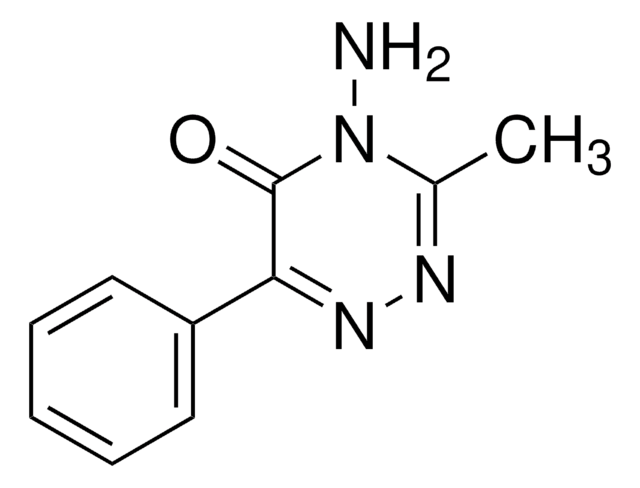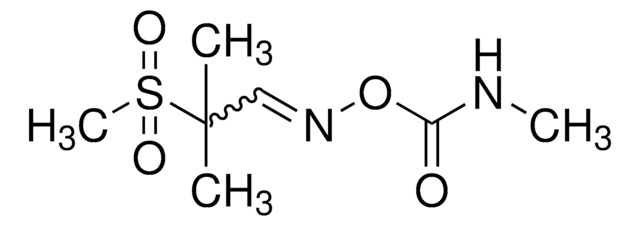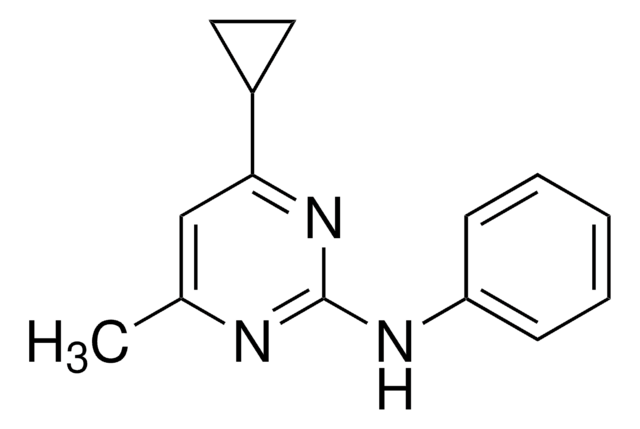CRM06796
Chloridazon
certified reference material, TraceCERT®, Manufactured by: Sigma-Aldrich Production GmbH, Switzerland
Synonym(s):
Pyrazone
About This Item
Recommended Products
grade
certified reference material
TraceCERT®
Quality Level
product line
TraceCERT®
shelf life
limited shelf life, expiry date on the label
manufacturer/tradename
Manufactured by: Sigma-Aldrich Production GmbH, Switzerland
storage temp.
−20°C
SMILES string
NC1=C(Cl)C(=O)N(N=C1)c2ccccc2
InChI
1S/C10H8ClN3O/c11-9-8(12)6-13-14(10(9)15)7-4-2-1-3-5-7/h1-6H,12H2
InChI key
WYKYKTKDBLFHCY-UHFFFAOYSA-N
Looking for similar products? Visit Product Comparison Guide
General description
Chloridazon is a selective organochlorine herbicide that belongs to the group of pyridazinone compounds. It acts as systemic soil and leaf herbicide by inhibiting the photosynthesis process. It is used for pre-plant, pre-emergence, and early post-emergence, to control annual broad-leaved weeds, sugar beets, and red table beets.
Chloridazon is not authorized for use in the European Union as per the European Council Directive 91/414/EEC concerning the placement of plant protection products on the European market. Maximum residue levels (MRLs) have been set according to Reg (EU) 2016/1015 for Chloridazon for various products of plant and animal origin from 0.05 to 5 mg/kg.
Application
- To examine the effects of chloridazon on the response of the frog neuroepithelial synapse to electrical stimulation and the basal values of the bioelectric parameters of the frog skin
- To study the transformation of n-chloridazon in a fixed bed bioreactor for verification of microbial degradability at different dosed contamination levels and govern the adaptation processes
- To investigate the effects of thermal and acid treatments on the sorption properties of a natural sepiolite by evaluating the adsorption process of chloridazon herbicide
- To prepare and characterize controlled release formulations of chloridazon using biodegradable polymers like ethylcellulose and lignin
- To investigate the potential use of lignin-based controlled release formulations (CRFs) to control release rate and leaching of metribuzin and chloridazon in soils
- To synthesize a meso-sorbent silica/polyaniline (MSNPs/PANI) composite for the removal of the chloridazon pesticide from the aqueous solution
Recommended products
Legal Information
Not finding the right product?
Try our Product Selector Tool.
Signal Word
Warning
Hazard Statements
Precautionary Statements
Hazard Classifications
Acute Tox. 4 Oral - Aquatic Acute 1 - Aquatic Chronic 1 - Skin Sens. 1
Storage Class Code
11 - Combustible Solids
WGK
WGK 2
Flash Point(F)
Not applicable
Flash Point(C)
Not applicable
Choose from one of the most recent versions:
Certificates of Analysis (COA)
Don't see the Right Version?
If you require a particular version, you can look up a specific certificate by the Lot or Batch number.
Already Own This Product?
Find documentation for the products that you have recently purchased in the Document Library.
Our team of scientists has experience in all areas of research including Life Science, Material Science, Chemical Synthesis, Chromatography, Analytical and many others.
Contact Technical Service










